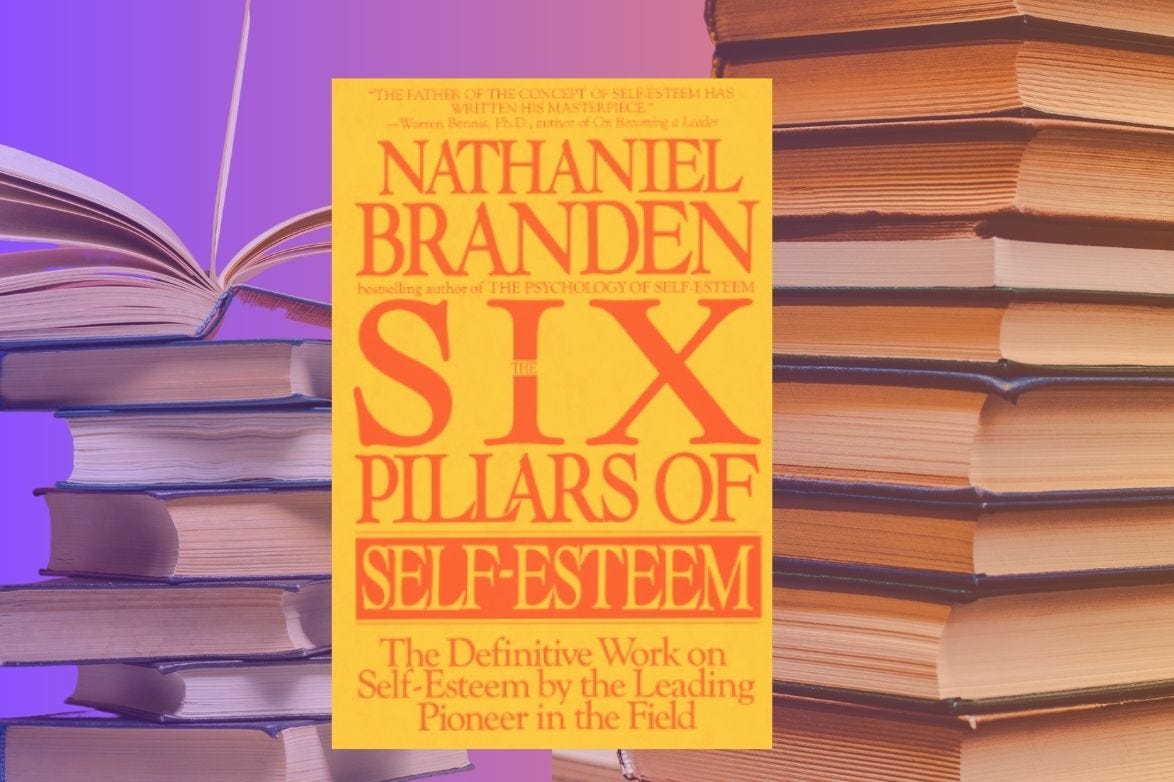The Vulgar Book Review: The Six Pillars of Self-Esteem by Nathaniel Branden
Ayn Rand's former boy toy wrote a pretty fucking good book on how to not feel like shit about yourself.
Welcome to Vulgar Book Reviews! Come along as we dig through the flaming pile of dog shit that is the self-help publishing industry to find books worth reading — and some worth lighting on fire.
Summary
Best Passages
Rating
Published back in ye old days of 1994, Nathaniel Branden’s The Six Pillars of Self-Esteem still reigns supreme in the vast kingdom of self-help literature.
Even Reddit, the hateful seventh circle of internet hell, seems to be in consensus that Pillars is a must.
But first, who the fuck is this Nathaniel Branden, and who made him the lord of self-esteem? Well, among many things, Branden was Ayn Rand’s former lover.
Branden, who died in 2014, was born in Canada in 1930 to Russian Jewish parents. Like most people with an active mind, school bored the fuck out of him so he spent most of his time buried in books at the library. We are assuming that is where he came across the works of Rand — philosopher, speed freak, and largely hated mother of objectivism, a school of thought characterized by the belief that reality is unaffected by human nature, thoughts, or feelings.
He began writing to Rand in 1950 after reading The Fountainhead. Eventually a friendship blossomed between Branden, his girlfriend and Rand and her husband,and their lives became, shall we say, engtagled. He even founded a whole-ass institute in 1958 to promote Rand’s philosophy of objectivism through lectures and courses nationwide.
In 1968, Rand trashed Branden publicly, leveling against him the heinous charges of philosophic irrationality and unresolved psychological problems. Branden hit back, stating that Rand was just pissed that he wouldn’t have an affair with her. But it turns out he did, in fact, have an affair with her, which he later revealed in his memoir. He later apologized to the masses for perpetuating the “dreadful atmosphere of intellectual repressiveness that pervades the Objectivist movement.”
ANYWAYS, Branden has been chipping away at the concept of self-esteem since the 1950s when he studied psychology at New York University while running a small therapy practice. He writes in Six Pillars that he noticed a common denominator among his patients: low self-esteem.
Summary
Branden comes in searing hot in the early pages of the book, defining self-esteem and why, in no uncertain terms, having a healthy dose of it is important if you want to remotely enjoy the experience of being alive.
This is not a book full of weird, self-stoking platitudes. There is no “Yas, queen” or “Slay, bitch” here.
Through a crips 370 pages and 18 chapters, Branden gives readers actionable ways to build self-esteem through the titular six pillars:
The Practice of Living Consciously
The Practice of Self-Acceptance
The Practice of Self-Responsibility
The Practice of Self-Assertiveness
The Practice of Living Purposefully
The Practice of Personal Integrity
Self-esteem, he writes, is built through behaviors. Some children are well nurtured by their caretakers and learn these behaviors early on. Some don’t and are left to fucking ping-pong through life until they take matters into their own hands and teach themselves.
Branden supports the theories in each practice with personal examples, and each chapter ends with simple exercises for mastering each practice. He’s pretty blunt in his assessment of what it takes to not be a piece of shit, which we love. Six Pillars presents a nearly inarguable case for self-esteem is built through learning that your feelings and opinions are not facts, embracing responsibility for your life, holding yourself to your own expectations, confronting rather than avoiding challenges, expanding your ability to cope; finding and acting on your purpose; and the courage to tolerate happiness without self-sabotage.
Best Passages
Self-esteem is the disposition to experience oneself as being competent to cope with the basic challenges of life and of being worthy of happiness. It is confidence in the efficacy of our mind and in our ability to think. By extension, it is confidence in our ability to learn, make appropriate choices and decisions, and respond effectively to change. It is also the experience that success, achievement, fulfillment – and happiness – are right and natural for us. The survival value of such confidence is obvious; so is the danger when it is missing.
When we live consciously, we do not imagine that our feelings are an infallible guide to the truth.
Self-esteem is a fundamental human need. It’s impact requires neither our understanding, or our consent, with or without our knowledge. When we remain a mystery to ourselves, we endure the consequences.
The belief that self-esteem can’t be built is a self-fulfilling prophecy.
To find it humiliating to be in error is a certain sign of flawed self-esteem.
What determines the level of self-esteem is what the individual does, within the context of his or her knowledge and values.
No one owes me the fulfillment of my wishes.
The temptation to self-betrayal can sometimes be worse with those about whom we care the most.
Rather it is a way of operating day by day, in big issues and small, way of behaving that is also a way of being.
Confidence in ability to think and cope with challenges of life.
Self-esteem flows with reality, self-doubt fights it.


